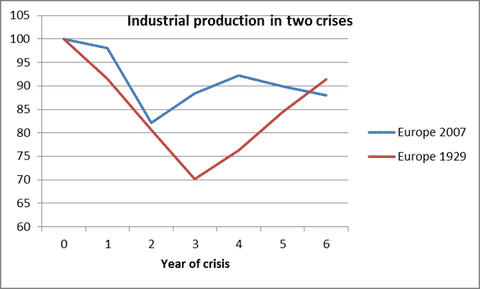Abstract: The crisis in Europe is now worse than in the 1930s, in major countries such as Britain, or Spain. So how come, differently from the 1930s, revolutions are not wrecking the streets? The aging of the population does not explain all the torpor. Nor does the fact that Europe suffers from globalization, also known as ‘free trade’, and plutocrats make sure that the Plebs is not aware of what ails them, or even, that they suffer at all: the wealthiest profit from the unfolding catastrophe.
A most subtle psychological mechanism is at work: Europe already tried something very bold, very virtuous, axed on the sustainable and, not only did it backfire, but it proved. completely unsustainable. A disabling injury joined by an insult to reason itself: no wonder Europeans feel too depressed to do anything about anything anymore.
EUROPEAN PLUTOCRACY: SUBJACENT TO MUCH.
I was reading newly published conversations of Hitler with his generals. Marshall Edwin Rommel and Hitler, in May 1943, discussed the dislike that “plutocrats” (yes, “plutocrats”, that’s the word they used) had for any social tendencies found in Nazism. In particular Hitler expressed the revulsion he felt in Rome, in 1938, for Italian plutocrats, and the triple game they played, through their control of the military, and double faced diplomacy with Britain, playing everybody against everybody.
Italian plutocracy did not come out whole from WWII. A republic was installed, with a slightly modified version of the French revolutionary flag. The daughter of the king, the one that Hitler gave his arm to, in 1938, died in an extermination camp, victim of an allied bombing.
Fast forward to May 2013, 70 years later. The Dutch are hysterical with joy: they just nominated a new plutocrat to head the Netherlands, William-Alexander, worth at least 300 million dollars. His wife is particularly popular. She is doubly plutocratic; barely twenty year old, before even having an economy degree, she was an investment banker in Argentina and New York (the biggest banks made like bandits from Argentinean default); she is the daughter of another plutocrat, a minister of the dictator Videla (famous for having tortured, before assassinating them, more than 30,000 people).
The hysterical Dutch wear orange. My Mom asked me why. I did not know, but I was correctly suspicious. It turns out that William-Alexander’s family used to rule, more than six centuries ago, the city of Orange. In Provence, France. Unfortunately, for the plutocrats, France is now a republic, sort of, so the followers of William-Alexander are reduced to waving orange flags, instead of waging terror in Orange, as they used to. Of course, Orange was built as one the free cities of the Roman republic, and only later was stolen by the ancestors of William-Alexander.
Kleptocracy or plutocracy? The latter is more general than the former.
I visited a 17 centuries old cathedral, the Saint Sauveur cathedral in Aix en Provence, four centuries older than Islam. Part of the cathedral was built even before Constantine became emperor. Then Constantine, a major plutocrat, if there ever was one, greatly thanks to fiscal measures, imposed Catholicism. The breathing of millennia endows our minds beyond this Earth.
Christianity, like Islam, was instrumentalized. The Saud family is trying to pose as the guardian of pure and hard Islam, but it violates the very foundation of Islam according to Muhammad, zakat (basically an anonymous voluntary tax the pious rich are supposed to impose on themselves, a command of the Qur’an). The Saudis know that they thrive, as long as people think in a way that revere them on top.
WHO COMMANDS MAKE CIVILIZATIONS MORE OR LESS POTENT & CREATIVE:
That the free are more motivated was already pointed out by Herodotus (see the last essay). What makes the minds of civilizations? Sometimes the oligarchy fabricates thoroughly the minds of the Plebs. Such robots show little mental creativity, even when they are requested to have some.
Indeed, even where they are allowed to be mentally creative, they will tend to be afraid of crossing scarlet walls across the mental landscape. This explains why the Roman empire lost much of its mental creativity, once it became a dictatorship. Even in the arts of war: the adoption of new weaponry in the first seven centuries of the Roman military dictatorship was roughly zero, in sharp contrast with the Roman Republic’s constant introduction of new weapons (although Constantinople introduced a crucial new weapon, Grecian Fire, the Seventh Century equivalent of the nuclear bomb).
Sometimes the oligarchy is ejected by a new, larger oligarchy, or several variants, in quick succession: this happened in England in the 17C. Sometimes the revolt is even larger, encompassing much of the middle class: that’s what happened in France in 1789. The American Revolution was still something else, as it was more of a civil war.
Who leads is who gives the minds to the commons. If only a few lead, little mind is to be had. The wider the leadership, the more mind for the commons. This explains why the French republic of 1792 was able to defeat the coalition of all European plutocracies that tried to crush her, including Britain, Russia, Austria and Prussia. French research in new high explosives and superior artillery was crucial in defeating the invading Prussian army at Valmy in September 1792 (same story as Captain napoleon’s artillery defeated the British at Toulon, a few weeks later).
WHY EUROPE TOLERATES AUSTERITY:
The lack of vision in Europe is, colossal. And not just from the leaders, but also from the Plebs. But how come is austerity still proceeding apace? Why, as jobs are dying, not enough people are screaming for work? Is it just because the more people are out of work, the more stabilizers of the welfare state are at work?
The control of the EU by right wingers is still a fact, except, in appearance, for the French Socialists (but most elected socialists are right wingers in disguise). Many European leaders are tied to Wall Street.
This explains why Mario Draghi, ex-partner at Goldman Sachs, is still practicing the strong Euro policy (that takes away millions of European jobs; the Euro ought to be half the value it’s at, right now). That favors his masters on the other side of the ocean.
All these facts are known, but why no truly massive demonstrations? In May 1968, just because the state was too authoritarian, all of France went on strike, for a month (something similar happened in Czechoslovakia, and, in the USA, and LBJ declined to be candidate to the presidency again).
OK, people are older now, their anger hormones less in control.
Yet another fact is at work. Europe made a giant effort, 25 years ago. Europe had two visions: the free market, “libre concurrence”, and ecology. Both visions have failed. The free market, it turns out mostly meant that banks were free to exploit the consumers and the states, and that plutocrats could live, tax-free, more powerful every year.
Many of those on the deep left said:”we told you so!” But even them have run out of critical steam. Indeed, they wanted to help the Third World, desperately. Now the Third World is helping itself with second, third, and actually, all servings. So what are European progressives going to say? Take jobs away from the Vietnamese, give them back to the French, who are paid twenty times more? Do they want to exploit the Third World, like the colonialists they used to criticize?
Sustainable energy is an even more painful subject, a wreck of European hopes and struggles. Ecological virtue has made European disadvantage even worse. Huge investments and efforts were engaged, great hopes raised, to curb the rise of the CO2. The rest of the world, led by the USA, refused to collaborate.
Thus, that vision has been a disaster. First, industrial production was delocalized in places that did not mind using the cheapest energy. Hence the global CO2 production was in no way impacted.
Secondly, European sanctions against energy production hobbled European industrial production and enabled those others, led by the USA, to get immense economic advantages, while the seas and temperatures rose, and Europe economic advantage sank.
British electricity prices have tripled in less than ten years. Even Germany, right now, having decided to get out of old fashion nuclear energy is finding the going tough, increasingly intolerably expensive. The French have wrecked their car industry by imposing tough CO2 standards.
Overall, because of Euro (and pound!) over-evaluation, the European economy has become uncompetitive (in spite of the German ‘success’, which is more appearance than reality).
Result? Now the Europeans are scared of any new vision, embarking in the many new ventures that really getting out of austerity would entail, lest something even worse comes about. They suffer from a subconscious feeling that they did something uncomprehendingly, immensely bad, by showing too much initiative. Hence a dreadful determination to not go grandiose again. And thus the willing, collective wearing of the hair shirts.
This is why there is no explosion yet. And why the bought off right-wingers, the Barrosos, Rehn, Junkers, German central bank head, and other austerians, keep on talking loud and strong. All the more as they have to disguise how wrong they were. And what better disguise for error than to keep on insisting that they were right?
And what of the USA? The sequester may bring a disaster: it’s pretty similar to what happened in Europe in the last few years.
When Roosevelt became president, he advocated to have no fear. Indeed one can hardly expand an economy when everybody is hiding below a rock.
Patrice Ayme






